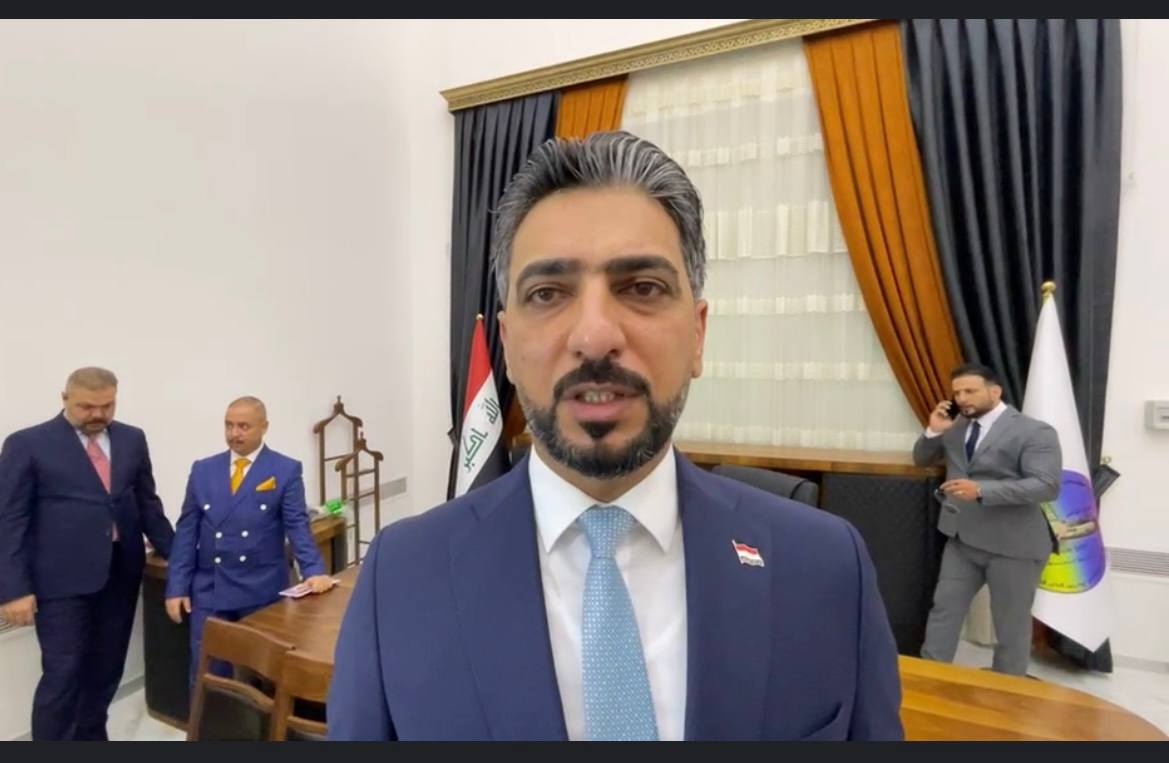Mohammed Ibrahim al-Hafez, the speaker of the Kirkuk Provincial Council, stated that he is prepared and determined to fulfill his duties. He emphasized that he and the council members' team will provide more than what is necessary, in coordination with Rebwar Taha, the governor, and deputies.
In an exclusive interview with KirkukNow, following taking office, he affirmed that employment is at the top of their agenda, and he will be a supporter for the youth, sports and the media.
Al-Hafez was elected as the speaker of the Kirkuk Provincial Council on August 10 during a meeting at the Rashid Hotel in Baghdad.
The ceremony was attended by the governor and several council members from the Patriotic Union of Kurdistan PUK, Arab, and Christian factions, as well as other prominent figures.
Eight months after the elections, the Kirkuk Provincial Council held its first meeting on August 24 and established three priorities: amending the bylaws, creating a mechanism to employ 7,000 people, and working to engage members who had boycotted council meetings. However, it remains unclear when they will progress with the governor on the budget.
"In the near future, the contract employment process will commence, which will help alleviate the burden on recent university and college graduates. We will send an official letter to the province to initiate the process," Hafez said.
The northern, oil-rich ethnically mixed province Kirkuk is home to about 1,77 million Kurds, Turkmen, and Arabs. Located 238 kilometers north of Baghdad, Kirkuk is an ethnically mixed province and has long been at the center of disputes between the federal government in Baghdad and the Kurdistan Regional Government KRG.
"What we decided in the initial meeting was to establish a mechanism for the 7,000 positions allocated to Kirkuk province. A committee of members will oversee this," al-Hafez said. "We will form this committee within the Kirkuk Provincial Council to ensure fairness and the rights of all communities."
According to provincial labor law, the provincial council is the highest legislative authority overseeing the government's operations in the province. They are responsible for discussing and approving the provincial budget, which must be submitted through the governor.
"We will support the administration of Kirkuk in every way possible, monitoring the governor and all government offices in the province," he stated.
"We have discussed and voted to form a committee to amend the bylaws," he added, noting that only nine members attended the initial meeting.
Nine out of 16 council members from Baghdad were present on August 10 to meet the quorum, appoint the presidency, and establish the pillars of local administration. This occurred despite protests and boycotts from some members of the Arab faction, Turkmen (the Iraqi Turkmen Front ITF two seats), and the Kurdistan Democratic Party (KDP) two seats).
Thirty minutes after assuming the council speaker position, al-Hafez described the day as "historic" and the start of a new phase for Kirkuk. This followed years of stagnant local administration and citizen deprivation due to election postponements caused by party conflicts.
The Arabs held all senior positions in Iraq, including Kirkuk, up to 2003. Since 2005, the Kurds have held the senior positions in Kirkuk, including the governorship, up to October 2017 when Iraqi troops ousted the Kurdish forces following the declaration of victory over the Islamic State in Iraq and the Levant (ISIL) and the Kurdish referendum for independence.
The Kurdish governor was replaced late 2017 by acting governor, Rakan al-Jibouri, an Arab, who currently with the Turkmen oppose election of new governor.
The speaker of the Kirkuk Provincial Council mentioned that they had decided to engage the seven members who had boycotted meetings at the first council meeting. A committee will visit them to initiate collaborative efforts within the Kirkuk Provincial Council.
"We will strongly support youth and journalists in obtaining their rights and benefits, implementing the provisions of the provincial council law that emphasize the importance of inclusive participation in local government," he said.
Power distribution in Kirkuk will be based on fair representation, ensuring the involvement of all province communities regardless of election outcomes, as outlined in Article 35 of the Provincial Council Electoral Law No. 12 of 2018 as amended.
"We have reserved numerous positions for the Turkmen until their return to council sessions," al-Hafez noted.
The ITF and some Arab members have filed a complaint against the council meeting in Baghdad and the post decisions in the Federal Court, awaiting a ruling.
"We will collaborate with our partners to enhance the industrial sector, public services, garbage collection and tidiness, and work as a unified team with the Kirkuk administration to achieve genuine peaceful coexistence," he concluded.
The Kirkuk Provincial Council comprises 16 seats, with seven held by Kurds (five for the PUK and two for (KDP)), six by Arabs (including three from the Arab coalition, two leadership seats, and one Arab seat), two by Turkmen, and one for the Christian quota.





